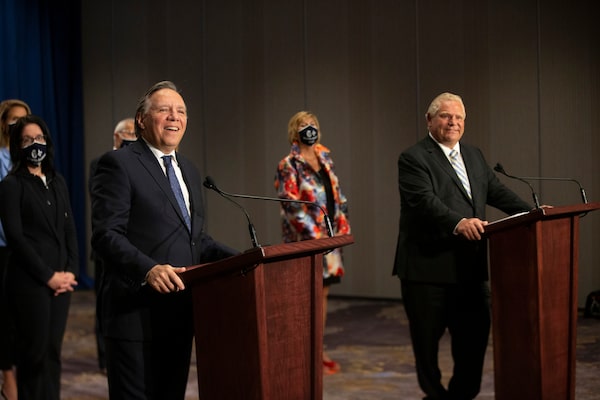
Quebec Premier Francois Legault, left, stands alongside Ontario Premier Doug Ford, right, as they hold a joint press conference during the Ontario-Quebec Summit in Toronto on Sept. 9, 2020.Chris Young/The Canadian Press
The premiers of Ontario and Quebec say they have agreed to push the federal government for a substantial increase to health care funding and the Prime Minister says he is open to discussions.
The premiers also said they have no plans to follow British Columbia in reimposing crackdowns on bars and nightclubs in the face of rising COVID-19 cases.
Ontario Premier Doug Ford and Quebec Premier François Legault, along with key members of their cabinets, met on Wednesday at a hotel in Mississauga. Addressing the media after, both leaders vowed to work together to push Prime Minister Justin Trudeau to increase the federal government’s health transfers to provinces.
Mr. Legault said provincial health systems have been chronically underfunded for decades, long before COVID-19, with Ottawa now covering just 21 per cent of the annual $200-billion bill. But the two premiers declined to request a specific increase from Ottawa, saying they need to speak with the country’s other premiers at meetings later this month.
“The problem is increasing year after year,” Mr. Legault said. “What we’re asking now to Mr. Trudeau is, what about next year and two years and three years from now? What do we do with this problem that was there before the pandemic?”
Mr. Ford echoed the sentiment: “No province can go it alone in health care these days.”
Mr. Trudeau told reporters in Toronto on Wednesday before Mr. Ford and Mr. Legault spoke that his government has provided billions in pandemic aid to provinces and will “continue to be there” for them. He said he will begin discussions with premiers about “next steps” in continuing to help. Mr. Trudeau has a call scheduled with the premiers on Thursday.
The Quebec and Ontario premiers also said Wednesday that they had agreed to press Mr. Trudeau for funding on other issues affecting the economic recovery, such as public transit and the expansion of broadband internet access – over and above the billions Ottawa has already pledged in fending off COVID-19 and its after-effects.
The two leaders also faced questions about their own plans to contain coronavirus infections, with numbers rising in both provinces and elsewhere in Canada in recent weeks.
Ontario has seen its COVID-19 numbers creep upward in recent weeks, regularly rising over 150 new cases a day: It said Wednesday it had found 149 new cases of COVID-19, after registering 185 new infections the day before. Quebec said Wednesday it had found 180 new cases.
British Columbia officials, alarmed at rising cases, announced a shutdown of nightclubs and banquet halls and a 10 p.m. cutoff for alcohol sales in bars on Tuesday.
But with infections also increasing in Toronto, neighbouring Peel Region and Ottawa – and the school year getting under way – Mr. Ford said Wednesday it is up to local health officials to restrict or close bars or tighten existing limits on private gatherings.
He said local medical officers of health in regions that might want to tighten rules – including regulations limiting outdoor gatherings to 100 people and indoor gatherings to 50 – already have the power to do so. Across-the-board restrictions, Mr. Ford said, were unfair to other parts of the province with little or no COVID-19 cases.
Mr. Legault also said he was also not considering a renewed crackdown on bars or nightclubs, saying they were not a major source of new cases in Quebec: "Right now the main problems are coming from private gatherings. So that’s where we have to ask the population to respect the two metres and to wear a mask, and not have parties with many people.”
But Mr. Ford’s assertions that local authorities should impose their own measures to contain outbreaks were contested by officials in Toronto. The Premier said health legislation allows local medical officers of health to further restrict the number of people allowed at events and that Toronto Mayor John Tory and other mayors already had the power to order bars to close early.
The Health Protection and Promotion Act does allow the medical officer of health to close individual businesses and issue fines of up to $25,000 for violating a health order, as Eileen de Villa, Toronto’s medical officer of health, threatened in the pandemic’s early days.
But Toronto and provincial officials appear to differ about the extent of these powers. Dr. de Villa said in an e-mail Wednesday that city council does not have the power to trump the province’s liquor laws and impose blanket rules on opening hours. She also said the city would have to “carefully review” whether it had the legal authority to tighten the province’s existing emergency orders on gathering limits for Torontonians.
Speaking to reporters, Dr. de Villa said she wanted to avoid any new “broad-based" lockdowns while instead focusing on boosting the public’s “buy-in" for the current rules.
Patrick Brown, the mayor of Brampton – where officials say private parties, among other causes, have contributed to the spread of COVID-19 – called for the province to review its current limits on large gatherings. He said his city’s bylaw officers have been called to many backyard parties, only to be left powerless to act when it turns out the events have fewer than 100 attendees.
“When the province says that places of worship can meet, and that you can have outdoor events, it’s difficult for us to rein in that activity,” he said in an interview.
With a report from Kelly Grant
Our Morning Update and Evening Update newsletters are written by Globe editors, giving you a concise summary of the day’s most important headlines. Sign up today.
 Jeff Gray
Jeff Gray Laura Stone
Laura Stone